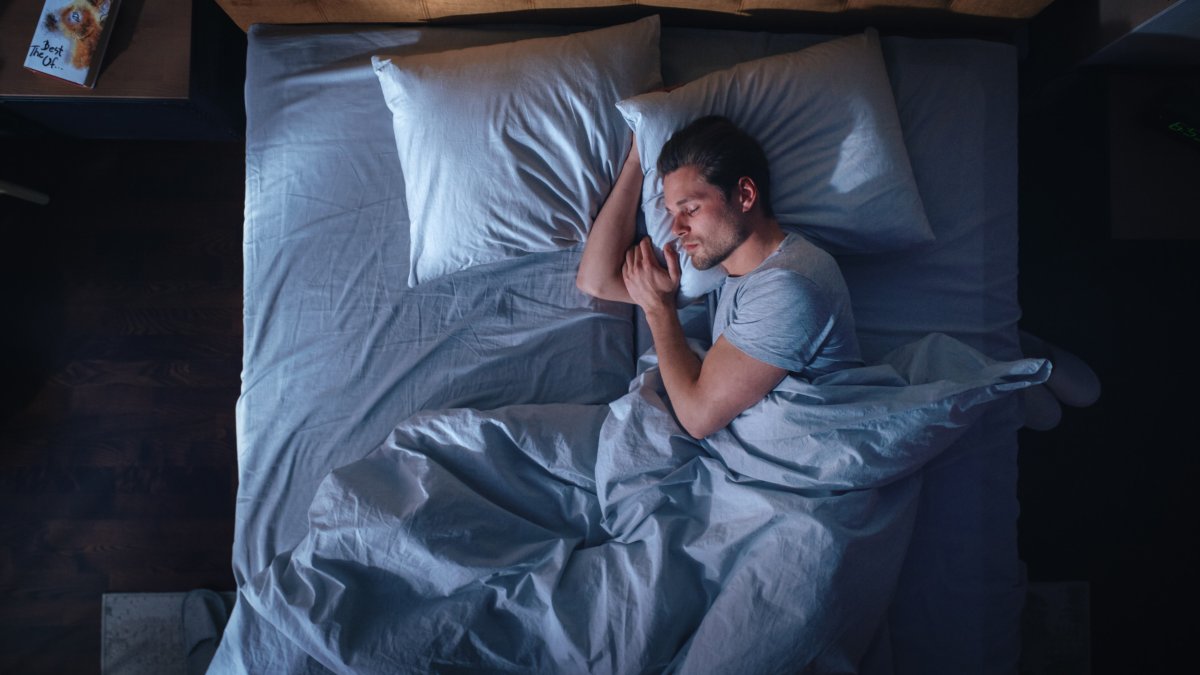-
UC considers adopting semester system at all schools - 5 mins ago
-
Tibor Kapu Begins Pioneering Experiments Aboard the Space Station - 11 mins ago
-
Paralyzed man speaks and sings with AI brain-computer interface - 14 mins ago
-
At least 74 killed as Israeli forces strike a Gaza cafe and fire on people seeking food, health officials say - 22 mins ago
-
Couple Renovate ‘Fixer-Upper’ House—Then They Realize What Was in the Walls - 26 mins ago
-
Wilyer Abreu belts a GRAND SLAM to help Red Sox extend lead over Reds - 31 mins ago
-
Budapest to Modernize Bus Fleet with Nearly 300 New Vehicles - 44 mins ago
-
Hardcore birders and casual sparrow spotters: Science needs you - 47 mins ago
-
Pawnbroker Buys Signed CD—Then Message From a Stranger Changes Everything - about 1 hour ago
-
Record rainfall in central China leads to flooding and evacuations - about 1 hour ago
Everyday Food Might Be the Reason You Sleep So Badly
A new study suggests that loading up on dairy products before bed might do more than cause a stomachache—it could be fueling your nightmares.
Researchers have found a strong link between lactose intolerance and disturbing dreams, potentially because gastrointestinal discomfort during the night disrupts sleep and bleeds into what people experience while dreaming.
“Nightmare severity is robustly associated with lactose intolerance and other food allergies,” said Dr. Tore Nielsen of Université de Montréal, lead author of the study published in the journal Frontiers in Psychology.
“These new findings imply that changing eating habits for people with some food sensitivities could alleviate nightmares. They could also explain why people so often blame dairy for bad dreams!”
According to a 2017–2018 study by the Agricultural Research Service (ARS), 68 percent of 2,918 adults consumed cheese—either alone or as an ingredient—on any given day. Cheese offers benefits such as improving oral health and boosting daily calcium intake, but the timing of consumption may come at a price.
FotoDuets/iStock / Getty Images Plus
Probing an Old Folk Belief
For centuries, people have suspected that what they eat affects how they sleep—but scientific evidence has been scant. To test the connection, Nielsen and his team surveyed 1,082 students at MacEwan University in Canada. Participants were asked about sleep duration and quality; dreams and nightmares; perceived links between food and dreams; and their mental and physical health.
About a third of respondents reported frequent nightmares. Women were more likely than men to remember their dreams, to report poor sleep, and to experience nightmares. They were also nearly twice as likely to say they had a food allergy or intolerance. Around 40 percent of participants believed eating late or consuming specific foods affected their sleep, while about 25 percent thought particular foods actively worsened it. Those with less healthy diets reported more negative dreams and had poorer dream recall overall.
“We are routinely asked whether food affects dreaming—especially by journalists on food-centric holidays,” said Nielsen. “Now we have some answers.”
Dairy in the Hot Seat
While only a small fraction of participants (5.5 percent) said they thought food changed the tone of their dreams, many of those who did blamed sweets, spicy food or dairy for making dreams more bizarre or unsettling. When researchers analyzed the data, they found that lactose intolerance was specifically associated with nightmares, gastrointestinal symptoms and poor sleep quality.
“Nightmares are worse for lactose intolerant people who suffer severe gastrointestinal symptoms and whose sleep is disrupted,” said Nielsen. “This makes sense, because we know that other bodily sensations can affect dreaming. Nightmares can be very disruptive, especially if they occur often, because they tend to awaken people from sleep in a dysphoric state. They might also produce lsleep avoidance behaviors. Both symptoms can rob you of restful sleep.”
The authors suggest that dairy could provoke digestive issues in lactose-intolerant individuals, with discomfort carrying over into the dream state. This mechanism may explain the persistent folk belief that eating cheese before bed leads to nightmares.
Can Diet Improve Sleep?

gorodenkoff/iStock / Getty Images Plus
Interestingly, the study found fewer participants linking food and dreams than in a similar study Nielsen and co-author Dr. Russell Powell ran 11 years ago. The researchers speculate this might be due to improved awareness of food intolerances, with students today avoiding trigger foods that could disturb their sleep.
“This could mean that simple dietary interventions might help people improve their sleep and overall health,” the authors write. But they also caution that apart from the strong link with lactose intolerance, the overall relationship between food and sleep quality remains murky. Poor diet might lead to poor sleep, but the reverse might also be true, or both could be influenced by a third factor.
“We need to study more people of different ages, from different walks of life, and with different dietary habits to determine if our results are truly generalizable to the larger population,” said Nielsen. “Experimental studies are also needed to determine if people can truly detect the effects of specific foods on dreams. We would like to run a study in which we ask people to ingest cheese products versus some control food before sleep to see if this alters their sleep or dreams.”
Do you have a tip on a science story that Newsweek should be covering? Do you have a question about organelles? Let us know via science@newsweek.com.
Reference
Nielsen, T., et al. (2025). More dreams of the Rarebit Fiend: Food sensitivity and dietary correlates of sleep and dreaming. Frontiers in Psychology. http://dx.doi.org/10.3389/fpsyg.2025.1544475
Source link































